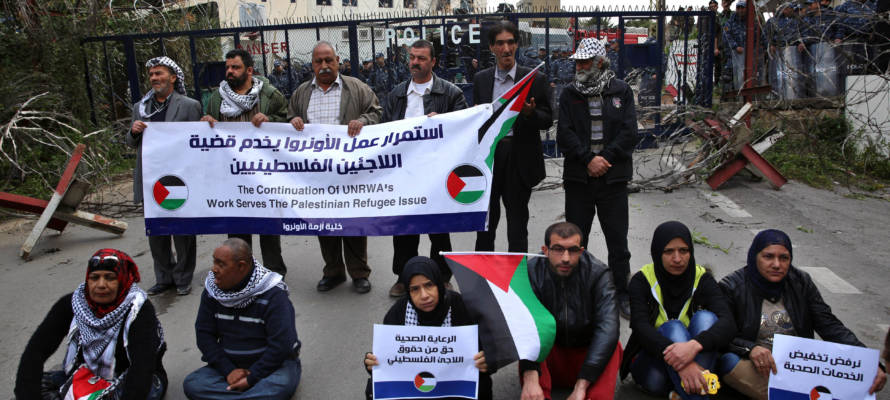Unlike other reports, this one has barely been mentioned in the media and certainly hasn’t been publicized much by UNRWA – mostly because Israel cannot be blamed for Lebanese discrimination against Palestinians. The report also admits that UNRWA inflates the figures of “refugees” in Lebanon.
By: The Algemeiner
UNRWA, together with the American University of Beirut, released a 240-page report on the situation of Palestinians in Lebanon — both the population that has been there since 1948, and the more recent refugees from Syria.
While it correctly mentions the institutionalized discrimination against the Palestinians, it obscures one important point:
More than 67 years after their initial presence in Lebanon, Palestine refugees are still considered as foreigners under Lebanese law, which does not grant them any special legal status and deprives them from basic rights enjoyed by the Lebanese. This prolonged foreigner status mainly stems from the strong rejection by the Lebanese authorities of the naturalization of Palestine refugees, which is sometimes used as justification for the various discriminatory policies against them. On a political level, Palestine refugees have also opposed naturalization. Accordingly, despite their longstanding presence in the country as refugees, PRL remain excluded from key aspects of social, political, and economic life. They face legal and institutional discrimination; they are denied the right to own property and face restrictive employment measures such as a ban from some liberal and syndicate professions.
Palestine refugees in Lebanon (PRL) face one of the worst socioeconomic conditions in the region, and these have been deteriorating given the country’s weakening socioeconomic situation and the prolonged Syria crisis. A little short of two thirds of the PRL population is poor, a proportion that has not changed since 2010, and the discriminatory laws against them hinder their ability to improve their living conditions and livelihoods. Decaying infrastructure, a dearth of recreational spaces, insufficient access to roads, deteriorated water and sewage treatment systems, contaminated water, and jerry-rigged electrical wires along with open drainage ditches paint a gloomy picture of camps where over 63 per cent of PRL reside.
UNRWA is not being entirely truthful when it says, “On a political level, Palestine refugees have also opposed naturalization.” Yes, self-appointed leaders keep saying that they don’t want to become citizens in order to keep the dream of destroying Israel through the “return” alive; but in reality, Palestinians in Lebanon are clamoring to become citizens. Whenever a loophole opens up, tens of thousands of them apply.
The report also admits that UNRWA inflates the figures of “refugees” in Lebanon, keeping hundreds of thousands on its rolls who no longer live in Lebanon:
Some 495,985 Palestine refugees are registered with UNRWA in Lebanon.58 However, it is estimated that the actual number of Palestine refugees who still reside in the country ranges between 260,000 and 280,000 following the results of the 2010 socioeconomic survey conducted jointly by UNRWA and AUB.
UNRWA has no mechanism to remove people from its list of “refugees,” so even the ones who live permanently in Europe are considered “refugees” — phantoms who are still useful in agitating against Israel.
The report issues no recommendations for how to fix the situation. Lebanese discrimination and apartheid is considered normal and not worth making a stink about. Because Lebanon might respond by making things worse.
Unlike other UNRWA reports, this one has barely been mentioned in the media and certainly hasn’t been publicized much by UNRWA. Mostly because Israel cannot be blamed for Lebanese discrimination against Palestinians.
So this report will sink into obscurity, and do nothing to help the actual lives of actual Arabs who remain as pawns between their leaders, Lebanese leaders, the Arab world, UNRWA and the anti-Israel Westerners who claim to care about Palestinians, but whose concern doesn’t go beyond blaming everything on Israel.
